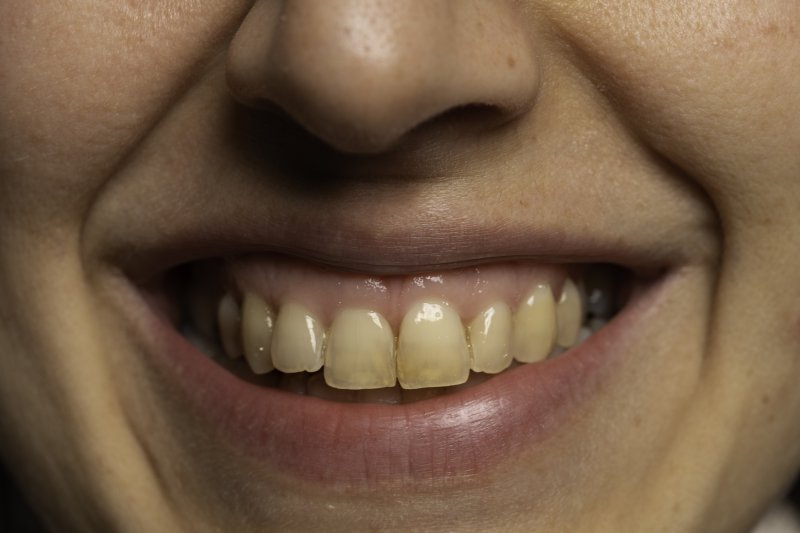
Everyone seems to dream of having a bright, white smile like what you see on the big screen. Unfortunately, we aren’t all born with the model-like smile that we have always wanted. Discoloration can be caused by numerous different factors, including tobacco use, drinking pigmented beverages, and aging. But can tooth stains be genetic as well? Continue reading to learn more about how genetics can affect the appearance of your teeth.
Which Genetic Conditions Can Cause Discoloration?
There are two different types of genetic conditions that can cause inherited tooth staining or discoloration:
- Dentinogenesis imperfecta: This is an inherited genetic condition that causes grayish, transparent tooth enamel and weak, brittle teeth. This can affect either baby teeth or permanent teeth.
- Amelogenesis imperfecta: This is another inherited condition that’s caused by genetic mutations. It causes a yellow-brown tooth discoloration and soft, fragile enamel that’s prone to grooving and pitting. This condition can also increase the risk of tooth decay, chipping, cracking, and breaking.
How Else Can Genetics Affect the Appearance of Teeth?
Even if you aren’t suffering from a genetic condition that causes tooth discoloration, genetics can still affect the color of a person’s teeth. Thick, white enamel runs in families, as does thin, more transparent tooth enamel. If you naturally develop teeth that are more on the yellow side, you may not respond well to store-bought teeth whitening. There are two different types of staining:
- Extrinsic tooth discoloration is usually caused by foods, drinks, and tobacco usage.
- Intrinsic staining is more difficult to treat because it is present below the enamel. This can be caused by certain medical conditions and medications.
How Can Genetic Tooth Discoloration Be Treated?
If you suffer from naturally discolored teeth, the good news is that you have several options. Professional teeth whitening is generally the first thing to be considered. Store-bought teeth whitening doesn’t usually provide great results, but whitening from your dentist is much stronger and more effective.
If you have a genetic condition that causes weak, discolored teeth, a restoration may be able to help you get the whiter results you’re hoping for. This includes the use of dental crowns, dental veneers, and dental implants. By working with your dentist, you can come up with a plan that is best able to help you meet your smile goals.
You don’t need to settle for a smile that you aren’t proud to show off. Ask your dentist about your teeth whitening options. This way, you can put your pearly whites on display with confidence!
About the Author
Dr. Stephen Dean earned his dental doctorate from the Medical University of South Carolina and is committed to continuing education to keep his knowledge and skills sharp. Currently, he holds a Fellowship with the International Dental Implant Association and is a proud member of numerous other professional organizations, including the American Dental Association and American Academy of Cosmetic Dentistry. For more information or to schedule an appointment at his office in Covington, visit his website or call (770) 786-3915.

